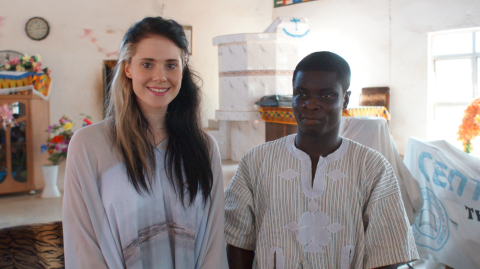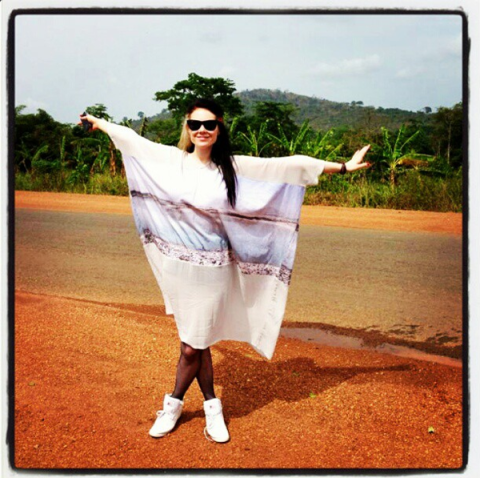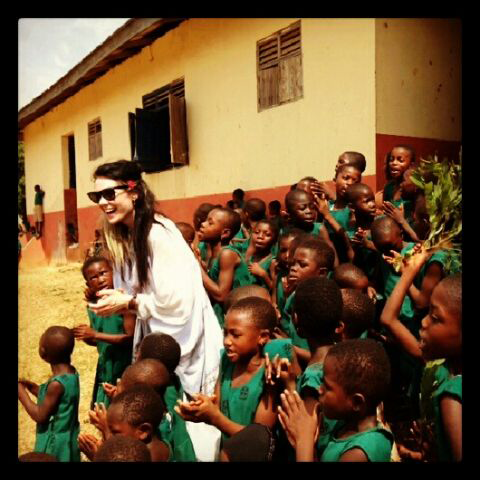
“I feel about nervous about this. I think it’s going to be intense. So we’ll see. It’ll be awesome. It’s going to be amazing,” British singer-songwriter Kate Nash told Samaritanmag before she left for Ghana to better educate herself about the program she will be promoting for Plan International’s Because I Am A Girl campaign.
Now the 25-year-old has returned from her whirlwind trip and sat down with Samaritanmag again to discuss her experience. She is specifically involved with Protect A Girl, an initiative dedicated to providing girls with the support they need to reach their full potential.
Because I Am A Girl creates sustainable projects in developing countries to give girls access to clean water, food, healthcare, education, and protection from violence and exploitation, it states on the web site.
Nash, whose new album Girl Talk just came out will be making Protect A Girl a talking point as she tours North America and other places across the globe throughout the year.
Read the initial interview first to find out why she got involved with Because I Am A Girl, the other causes that are important to her, and how she was feeling before she left for Ghana.
When Samaritanmag last spoke with you, you were heading to New York for a debriefing with Plan International about your trip. How did they prepare you?
“I guess explaining what we were going to be doing exactly, which was going to a village called Hohoe and meeting the Chief and elders and getting permission from them to visit the primary schools and secondary schools, and then meeting the kids and then meeting the Girls Making Media group, which is the group that Plan’s work with there.”
Was there anything they told you not to do?
“No, just be prepared for the culture, how the kids were going to be so excited and sort of crazy. I don’t think there was anything not to do. Just general things about being careful with the food over there because of the sensitive western belly [laughs]. “
But nothing in terms of what to say to the kids or to just make sure you distribute your attention to everyone?
“Maybe trying to distribute attention to everybody because I had heard you can bring over colouring pens and stuff and they said there’s gonna be so many kids, it’s better not to do that because you don’t want anyone to be left out. But just that they were gonna be very curious.

What did you do when you first got to Ghana?
“We landed, and then had that night at the hotel — it was four girls hanging out together. We told loads of ex-boyfriend stories, so to was a very girl power trip and then I got ready to get up early. I had all my clothes prepped, and what I was going to wear because I’m not good in hot weather either.”
Did you go casual?
“Yeah, I wasn’t glammed up or anything. I had this quite good flowy moo-moo type thing that can look glamorous, but it was casual as well. It was just good for the heat. It was going to be an intense long day in sweltering heat and I didn’t want to look too disgusting basically.”
How long were you there?
“The trip was three days. It was short. It was just really weird getting out of the van and knowing I was going to meet a Chief of a village and they had this grand chair for me to sit on and I felt a bit uncomfortable about it, but they were all so welcoming and so nice. “
Did you have to greet the chief in any particular way?
“Yes, when they introduced us, I had to say something about why I was here and to thank them for having us in the village and then I shook hands with all of the elders. They do this really cool handshake where they go… [she demonstrates and it include a snap at the end].”
Very hip hop.
“Yeah, but it’s all the elders. They’re like 60, 70, 80 years old.”
And the chief was old?
“No the chief was actually young. The chief was in his 20s. But they were so sweet and nice and they brought us three big giant bowls of fruit to welcome us.”
What is the situation with these kids? They are living in poverty?
“They were living in mud huts and a lot of the kids didn’t have shoes and I was like, ‘Why don’t some these kids have shoes?’ ‘Well it’s a choice between shoes and education because you have to pay for education. So these kids in schools are pretty poor because their parents are paying for them to have an education, so that’s at least a positive side of it. And they were just so crazy; the kids start screaming as soon as they saw us and then you put your hand out and they were slapping us like low-fives and some of them were shy at first, but then they attach themselves to you. And then there were girls doing a dance in show-and-tell for me.”

“I think so. Actually a lot of the girls were touching my hair. The young girls were grabbing it — I think it was like white [girl], long hair — and they all have shaved heads; they’d never t seen it before so they all wanted to touch me and pull my clothes and feel what I was wearing. Tt was all very handsy and totally fun. All the girls were totally cute. I was standing next to them for a picture and I could feel [demonstrates by ever so slightly pulling on my hair from behind] them do that but they were trying to be all secret about it.”
How old were these kids?
“The younger ones [at Plan Ghana pre-school at Likpe Mate] were like four to 10, 11. The older ones were like 15 to 18 — that was so inspiring because they were part of the Girls Making Media course [at Likpe Mate] and they were talking about how they were educated about sexual assault and hygiene and bullying, and they’re going into their communities asking people ‘What can we do to make this better?’ and then they’re coming out [of the course] with short plays and dance. One guy was in the group and he was like, ‘I’ve gone home to tell my parents that girls have opportunities these days and they’re not just supposed to be in the kitchen.’ That’s fuckin’ amazing, you know what I mean?”
So there were guys in the school?
“There were a few guys in the Girls Making Media group. There was the younger school and the older school and just a few boys in Girls Making Media. I was like, ‘Why do you want to be here?’ and they were wanting to educate people about women’s rights, which is really incredible too — just seeing how little people had but how ambitious they were, and how smart, and how much they waned to better their world and communities.”
What is the Girls Making Media specifically about?
“A course within the school; it’s a class that they can take [for 15 to 18 year olds]. It’s education on issues like bulling, hygiene, sexual assault, a lot of things that girls comes across that they wouldn’t normally be educated about in Africa because they haven’t been given the right to do so before — and then being creative. They can do interviews on radio; they’re using computers; they’re using dance and drama to explore it and interviewing people. It was so cool. They were so amazing.”
Did you perform while you were over there?
“We sang. Once thing we did that was really cool was we all sang [the Eurythmics and Aretha Franklin 1985 duet] ‘Sisters Are Doin’ It For Themselves’ together, which was really fun. We just sang the chorus mainly because they hadn’t heard of the song. That was a really cool moment, everyone singing ‘sisters are doing it for themselves’ [laughs].”
What did you do on your last day there?
“We drove around and saw a bit more of Ghana and had a meeting with Plan to talk about the tour.”
Now that you’ve been there and you took it all in, what is the next step?
“Raising awareness of the campaign; directing people to protectagirl.org to sign up; and getting people to donate is the thing we’re working on right now. Then we’re planning a cool event in New York [at the Norwood Hotel] on the 29th called Girl Talk Girl Rising which is related to the movie Girl Rising [by director Richard E. Robbins]. It’s a documentary about girls from around the world really going through fucked-up shit and surviving it and being represented as superheroes rather than victims. And there’s this one girl from Egypt* who is part of the Plan course and we’d like to do this final end-of-tour [event] to screen some of the documentary, screen some of me in Africa and talk about Plan and also have almost like a record launch in New York too.”
(*Ed. note: The portion of the movie that will be screened is about a girl from an educational program supported by Plan Egypt. The story is very sensitive and depicts gender based violence. The girl is not identified in the movie andwill not be at the New York event. Mona Eltahawy is the author of this particular story from the Girl Rising movie that will screen at the event).
What ultimately was the impact on you after you went back to London?
“I have a video of the girls dancing with me. It was just the energy of the people and how upbeat and vibrant and fun and friendly they are — even people not having a lot. It’s a quite grounding experience because you realize where you can really get happiness from life. I think the main thing was the girls in the Girls Making Media group were just so empowered and ambitious and all so beautiful — people in Ghana are so stunning — but also they were like, ‘I want to be a journalist;’ ‘I want to be a sociologist;’ ‘I want to go to university.’ They were like, ‘Are you on Facebook?’ ‘Are you on Twitter?’ Even though they hadn’t heard of stuff — like they didn’t know who Aretha Franklin was or Annie Lennox — they were coming online and wanting to take control of their lives and their communities. If everybody had that attitude all over the world then imagine. It made me feel like there’s so many spoiled brat kids from America and the UK — everyone should go to these villages and see these people and open their minds a little bit.”
Patike